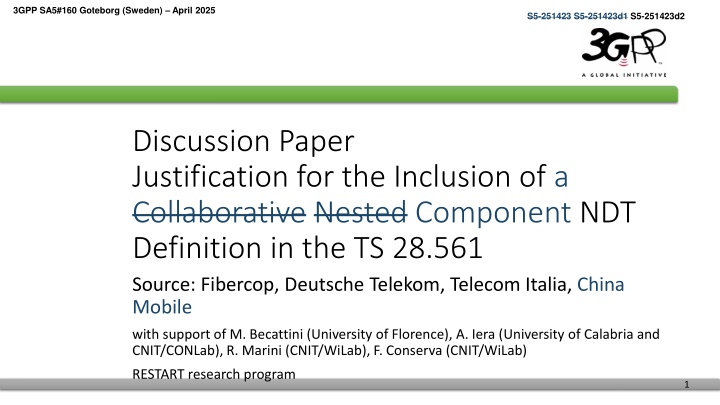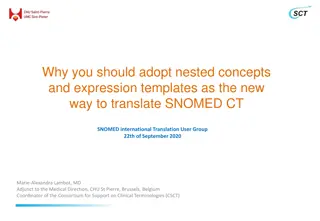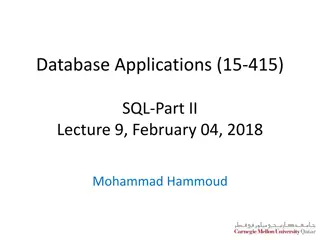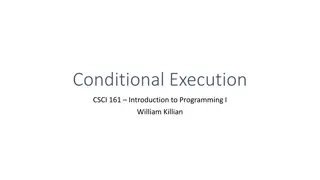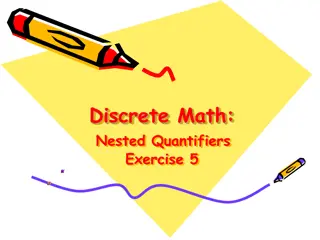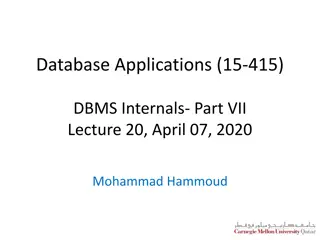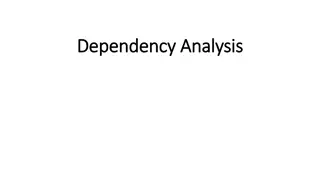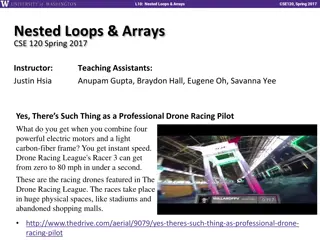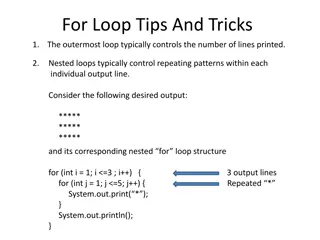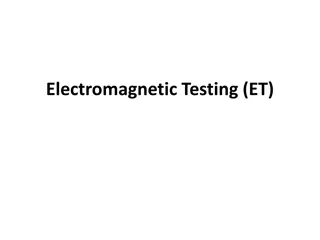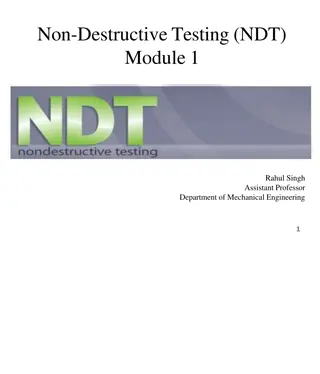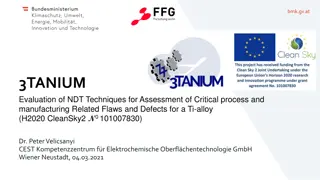Justification for Collaborative Nested Component NDT Definition
This document discusses the justification for including a collaborative nested component NDT definition in the TS 28.561 source. It explores the terms, concepts, use cases, requirements, and solutions related to Network Digital Twin (NDT) in the context of network management aspects. Recommendations for normative work and the specification of NDT aspects are detailed based on identified use cases.
Download Presentation

Please find below an Image/Link to download the presentation.
The content on the website is provided AS IS for your information and personal use only. It may not be sold, licensed, or shared on other websites without obtaining consent from the author.If you encounter any issues during the download, it is possible that the publisher has removed the file from their server.
You are allowed to download the files provided on this website for personal or commercial use, subject to the condition that they are used lawfully. All files are the property of their respective owners.
The content on the website is provided AS IS for your information and personal use only. It may not be sold, licensed, or shared on other websites without obtaining consent from the author.
E N D
Presentation Transcript
3GPP SA5#160 Goteborg (Sweden) April 2025 S5-251423 S5-251423d1 S5-251423d2 Discussion Paper Justification for the Inclusion of a Collaborative Nested Component NDT Definition in the TS 28.561 Source: Fibercop, Deutsche Telekom, Telecom Italia, China Mobile with support of M. Becattini (University of Florence), A. Iera (University of Calabria and CNIT/CONLab), R. Marini (CNIT/WiLab), F. Conserva (CNIT/WiLab) RESTART research program 1
3GPP SA5#160 Goteborg (Sweden) April 2025 S5-251423 S5-251423d1 S5-251423d2 TR 28.915 conclusions This technical report is the output of a study on management aspect of Network Digital Twin (NDT). It describes the terms and concepts of NDT. It also identified and documented the use cases and corresponding potential requirements, possible solutions by using the NDT. There are multiple valid and valuable use cases which may benefit from NDT. Solutions are proposed which are based on a new Management Service and associated network resource modelling. 1. issue inducement. NDT support for network automation including signalling storm analysis, emergency preparedness, network failure and risk prediction and network 2. NDT support for verification including RAN energy saving policy verification, configuration verification. 3. NDT support for generation including generating data for ML model training and measuring customer satisfaction with the network services 4. Advanced NDT capabilities including nested NDTs. NDT may consume management services exposed by different MnFs. How NDT can consume management services exposed by different MnFs to provide required NDT outputs is for further study. Based on the concluded use case and management capabilities, it is recommended for the normative work to: - Define the terms, concepts Network Digital Twin in 3GPP management system - activation, re-configuration and termination of an NDT. Develop requirements and solution for life-cycle management of an NDT instance as a general use case, including creating, configuration, activation, de- - (e.g., NDT modelling). Specify the above use cases, requirements and solutions for NDT , which includes the procedure, management operations and management information 2
3GPP SA5#160 Goteborg (Sweden) April 2025 S5-251423 S5-251423d1 S5-251423d2 SP-241938 Objective The objective of this work item is to specify the following aspects: WT1: Specify the terms and concepts of Network Digital Twin in 3GPP management system. WT2: Specify the use cases, requirements for Network Digital Twin in 3GPP management system. The following use cases are considered: WT2.1 Usage of an NDT instance and Life-cycle management of an NDT instance as a general use case, including creating, configuration, activation, de-activation, re-configuration and termination of an NDT. WT2.2 NDT application specific use cases to address following: WT2.2.1 NDT support for network automation, including signalling storm analysis , emergency preparedness , network failure and risk prediction and network issue inducement . WT2.2.2 NDT support for verification, including RAN energy saving policy verification , configuration verification . WT2.2.3 NDT support for generation, including generating data for ML model training and measuring customer satisfaction with the network services . WT2.2.4 Advanced NDT capabilities, including nested NDTs . WT3: Specify the solutions for NDT to support above use cases, which includes the procedure, management operations and management information (e.g., NDT modelling). WT3.1 Generic operations and generic information model for NDT. WT3.2 NDT application specific solution extending the generic information model with NDT application specific modeling information for the above use cases. 3
3GPP SA5#160 Goteborg (Sweden) April 2025 Some use cases which could require Nested Collaborative Component NDT specific services S5-251423 S5-251423d1 S5-251423d2 Failure Pradiction DT The vertical needs to assess the impact of a potential network failure on its own industrial processes: in this case, the digital twin of the industrial process must be synchronised and interoperate with the Nested Collaborative Component NDT provided by the NOP and associated to the NPN, as shown in the following figure, which specifies the following aspects 1. Internal architecture of Operator Nested Collaborative Component NDT: referring the involved NPN 2. Nested Collaborative Component NDT objectives 3. Interworking with IP-DT Network Domain Component NDT IP-DT Component NDT Component NDT Component NDT Multi-access Network POP Component DT The POP has to evaluate a configuration verification of a subnetwork with a shared part managed by the MOP. In this case, the POP needs to access the MOP Nested Collaborative Component NDT to interact with its own NDT, as shown in the following figure POP POP Component CN-DT ComponentR AN-DT MOP Component - DT POP CN Shared RAN MOP: Main OPerators, POP: Participating OPerators POP RAN 4
3GPP SA5#160 Goteborg (Sweden) April 2025 S5-251423 S5-251423d1 S5-251423d2 Relevance of Nested Collaborative NDT Modular Architecture and Scalability Enhanced NDT Interoperability Multi-Domain and Multi-Role Collaboration Proposal: taking into account the use cases and related requirements, a Nested Collaborative Component NDT definition shall be introduced in the TS 28.561 5
3GPP SA5#160 Goteborg (Sweden) April 2025 S5-251423 S5-251423d1 S5-251423d2 References 28.915 Study on management aspects of Network Digital Twin SP-241938 New WID on management aspects of Network Digital Twins 28.530 Management and orchestration; Concepts, use cases and requirements 28.557 Management and orchestration; Management of Non-Public Networks (NPN); Stage 1 and stage 2 32.130 Network sharing; Concepts and requirements ETSI GR ZSM 015 Zero-touch network and Service Management (ZSM); Network Digital Twin M. Becattini, A. Iera, L. Paroli and G. Fontani, Digital Twin Networks for Sustainable In-Network Computing in Future 6G Networks , IEEE International Symposium on Personal, Indoor and Mobile Radio Communications, PIMRC'24, 2 5 September 2024 , Valencia, Spain 6
